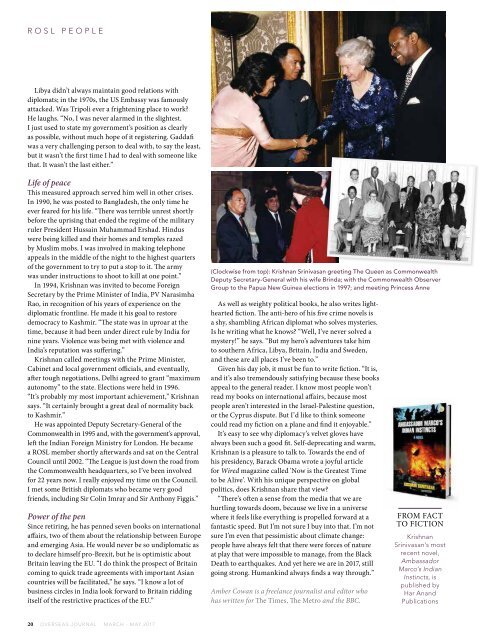OVERSEAS
1b6CMZPC9
1b6CMZPC9
Create successful ePaper yourself
Turn your PDF publications into a flip-book with our unique Google optimized e-Paper software.
ROSL PEOPLE<br />
Libya didn’t always maintain good relations with<br />
diplomats; in the 1970s, the US Embassy was famously<br />
attacked. Was Tripoli ever a frightening place to work?<br />
He laughs. “No, I was never alarmed in the slightest.<br />
I just used to state my government’s position as clearly<br />
as possible, without much hope of it registering. Gaddafi<br />
was a very challenging person to deal with, to say the least,<br />
but it wasn’t the first time I had to deal with someone like<br />
that. It wasn’t the last either.”<br />
Life of peace<br />
This measured approach served him well in other crises.<br />
In 1990, he was posted to Bangladesh, the only time he<br />
ever feared for his life. “There was terrible unrest shortly<br />
before the uprising that ended the regime of the military<br />
ruler President Hussain Muhammad Ershad. Hindus<br />
were being killed and their homes and temples razed<br />
by Muslim mobs. I was involved in making telephone<br />
appeals in the middle of the night to the highest quarters<br />
of the government to try to put a stop to it. The army<br />
was under instructions to shoot to kill at one point.”<br />
In 1994, Krishnan was invited to become Foreign<br />
Secretary by the Prime Minister of India, PV Narasimha<br />
Rao, in recognition of his years of experience on the<br />
diplomatic frontline. He made it his goal to restore<br />
democracy to Kashmir. “The state was in uproar at the<br />
time, because it had been under direct rule by India for<br />
nine years. Violence was being met with violence and<br />
India’s reputation was suffering.”<br />
Krishnan called meetings with the Prime Minister,<br />
Cabinet and local government officials, and eventually,<br />
after tough negotiations, Delhi agreed to grant “maximum<br />
autonomy” to the state. Elections were held in 1996.<br />
“It’s probably my most important achievement,” Krishnan<br />
says. “It certainly brought a great deal of normality back<br />
to Kashmir.”<br />
He was appointed Deputy Secretary-General of the<br />
Commonwealth in 1995 and, with the government’s approval,<br />
left the Indian Foreign Ministry for London. He became<br />
a ROSL member shortly afterwards and sat on the Central<br />
Council until 2002. “The League is just down the road from<br />
the Commonwealth headquarters, so I’ve been involved<br />
for 22 years now. I really enjoyed my time on the Council.<br />
I met some British diplomats who became very good<br />
friends, including Sir Colin Imray and Sir Anthony Figgis.”<br />
Power of the pen<br />
Since retiring, he has penned seven books on international<br />
affairs, two of them about the relationship between Europe<br />
and emerging Asia. He would never be so undiplomatic as<br />
to declare himself pro-Brexit, but he is optimistic about<br />
Britain leaving the EU. “I do think the prospect of Britain<br />
coming to quick trade agreements with important Asian<br />
countries will be facilitated,” he says. “I know a lot of<br />
business circles in India look forward to Britain ridding<br />
itself of the restrictive practices of the EU.”<br />
(Clockwise from top): Krishnan Srinivasan greeting The Queen as Commonwealth<br />
Deputy Secretary-General with his wife Brinda; with the Commonwealth Observer<br />
Group to the Papua New Guinea elections in 1997; and meeting Princess Anne<br />
As well as weighty political books, he also writes lighthearted<br />
fiction. The anti-hero of his five crime novels is<br />
a shy, shambling African diplomat who solves mysteries.<br />
Is he writing what he knows? “Well, I’ve never solved a<br />
mystery!” he says. “But my hero’s adventures take him<br />
to southern Africa, Libya, Britain, India and Sweden,<br />
and these are all places I’ve been to.”<br />
Given his day job, it must be fun to write fiction. “It is,<br />
and it’s also tremendously satisfying because these books<br />
appeal to the general reader. I know most people won’t<br />
read my books on international affairs, because most<br />
people aren’t interested in the Israel-Palestine question,<br />
or the Cyprus dispute. But I’d like to think someone<br />
could read my fiction on a plane and find it enjoyable.”<br />
It’s easy to see why diplomacy’s velvet gloves have<br />
always been such a good fit. Self-deprecating and warm,<br />
Krishnan is a pleasure to talk to. Towards the end of<br />
his presidency, Barack Obama wrote a joyful article<br />
for Wired magazine called 'Now is the Greatest Time<br />
to be Alive’. With his unique perspective on global<br />
politics, does Krishnan share that view?<br />
“There’s often a sense from the media that we are<br />
hurtling towards doom, because we live in a universe<br />
where it feels like everything is propelled forward at a<br />
fantastic speed. But I’m not sure I buy into that. I’m not<br />
sure I’m even that pessimistic about climate change:<br />
people have always felt that there were forces of nature<br />
at play that were impossible to manage, from the Black<br />
Death to earthquakes. And yet here we are in 2017, still<br />
going strong. Humankind always finds a way through.”<br />
Amber Cowan is a freelance journalist and editor who<br />
has written for The Times, The Metro and the BBC.<br />
FROM FACT<br />
TO FICTION<br />
Krishnan<br />
Srinivasan’s most<br />
recent novel,<br />
Ambassador<br />
Marco’s Indian<br />
Instincts, is<br />
published by<br />
Har Anand<br />
Publications<br />
20 <strong>OVERSEAS</strong> JOURNAL MARCH - MAY 2017


